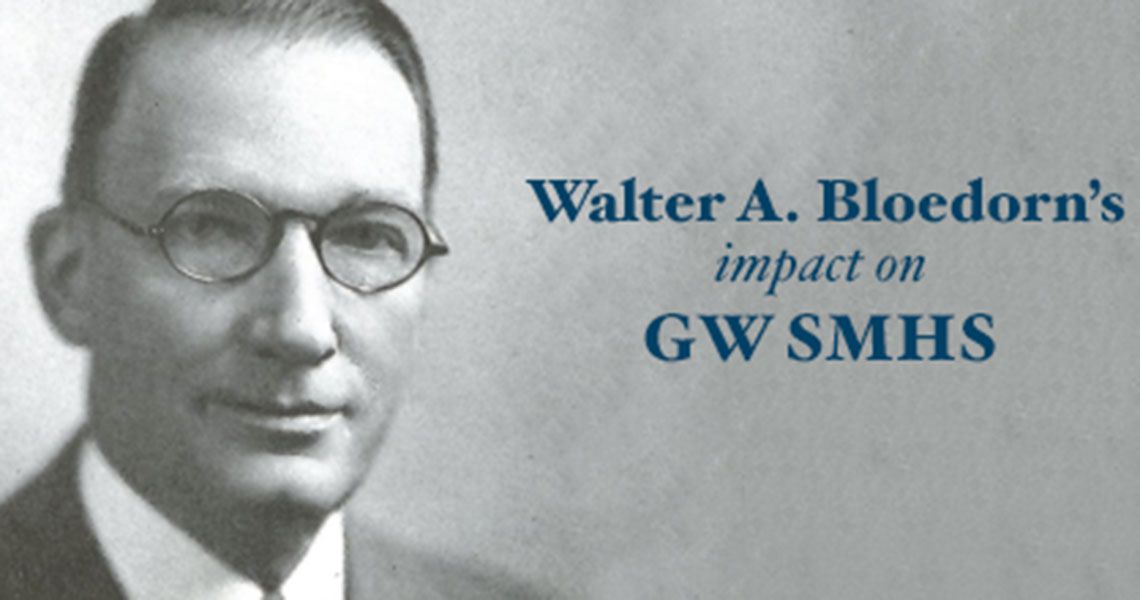A Nebraska native, Walter Andrew Bloedorn grew up in the small village of Platte Center. He graduated from Creighton University, the George Washington University (GW) School of Medicine in 1909, and earned his B.A. and M.A. from GW’s Columbian College of Arts and Sciences in 1915 and 1916 respectively. In 1948, GW conferred upon him a doctor of science degree honora causis. For the next 18 years, Dr. Bloedorn served as an officer in the Medical Corps of the U.S. Navy, traveling around the world on assignments.
Dr. Bloedorn’s long history of leadership positions began in 1926 when he was appointed professor of tropical medicine at GW’s School of Medicine. In 1932, Dr. Bloedorn was named medical director of the University Hospital, and, in 1939, he was appointed dean of the medical school, leading the school’s day-to-day operations. He served concurrently in these roles until his retirement in 1957.
Believing that a new hospital was in the nation’s best interest, Dr. Bloedorn successfully persuaded the U.S. Department of the Interior to fund a new building. Toward the end of World War II, construction at Washington Circle began, and, in 1948, the new GW Hospital opened its doors.
Along with his clinical and academic achievements, Dr. Bloedorn was instrumental in breaking down barriers that prevented African American physicians from practicing medicine. In 1954, there were no African American physicians on the GW Hospital staff. While teaching at Howard University and serving as chief-of-staff at Freedmen’s Hospital, two institutions that serve the African American community, Dr. Bloedorn met Edward C. Mazique, M.D., a well-known black physician and civil rights advocate. The two doctors developed a strong working relationship. Dr. Mazique often called Dr. Bloedorn to consult on some of his cases.
When Dr. Mazique sought professional admission to GW Hospital, he called Dr. Bloedorn and asked for his endorsement. In the words of Dr. Mazique’s biographer: “…the system was so dominated by white physicians, initially entrance was possible only through the kindness and open-mindedness of a few white doctors. Nowhere was this reality more evident than at George Washington University Hospital, where Dr. Walter Bloedorn was willing to take the risk necessary to support the appointment of its first black physician.”
A recognized authority on medical education, Dr. Bloedorn served as president of the Association of American Medical Colleges and of the National Board of Medical Examiners. He was a fellow of the American College of Physicians and a member of the National Committee of the United Nations Educational, Scientific and Cultural Organization (UNESCO).
Bloedorn’s tenure as dean was marked by many milestones including recruiting faculty members like John Parks, M.D., GW’s first full-time professor of obstetrics; Thomas Brown, M.D., professor of medicine from The Rockefeller University; and surgery pioneer Brian Blades, M.D., the school’s first professor of surgery.
For 46 years, Dr. Bloedorn called Washington, D.C. home. In an effort to give back to his community, Dr. Bloedorn used his wealth to establish the Walter A. Bloedorn Foundation in 1966. Today, this foundation upholds Dr. Bloedorn’s passion for quality care. After Dr. Bloedorn’s death in 1978, his widow, Ethel D. Bloedorn, established the Walter A. Bloedorn Chair in Administrative Medicine at GW’s School of Medicine and Health Sciences on behalf of the Walter A. Bloedorn Foundation.



